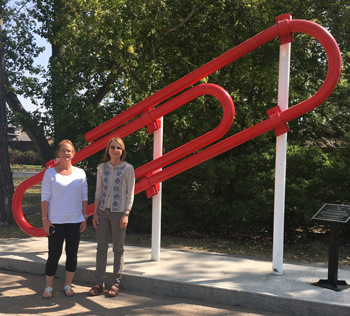
RaDAR Newsletter - January 2019
January 2019 Newsletter Edition
ONGOING RaDAR RESEARCH WITH PHC TEAMS
Led by Dr. Debra Morgan, RaDAR is collaborating with three primary health care (PHC) teams in southeast Saskatchewan to develop and adapt the Rural Primary Health Care Model for Dementia. Visit flow sheets based on the Primary Care Dementia Assessment and Treatment AlgorithmTM, developed by geriatric psychiatrist Dr. Dallas Seitz, provide point-of-care decision support for teams in their EMR systems.
The three teams have established 1-day memory clinics in Kipling, Weyburn, and Rural West (Bengough and Radville). Participating team members vary by location, including Physicians, Nurse Practitioners, Home Care nurses, Social Workers, Occupational Therapists, Physical Therapists, and an Alzheimer Society First Link Coordinator. Clinic day begins with a team/family conference for the first patient and their care partners, followed by patient assessments with each health care professional. Clinic day ends with final team/family conference to discuss the findings from the assessments and plans for follow-up. During the patient assessments, the First Link Coordinator meets separately care partners to assess their needs and connect them with the appropriate services and resources. A second patient and family are seen in the afternoon.
As part of this study, RaDAR meets regularly with PHC teams on an ongoing basis, focusing on teams' priorities for dementia care and progress related to the Rural PHC for Dementia model. This study is funded by the Canadian Consortium in Neurodegeneration on Aging (CCNA) and a CIHR Foundation Grant to Dr. Morgan.
NEW RaDAR PROJECTS
RaDAR Postdoctoral Fellows Dr. Amanda Froehlich Chow and Dr. Melanie Bayly are leading projects with PHC teams in southeast Saskatchewan. Dr. Froehlich Chow is examining team-based approaches to chronic disease management in older adults in usual care and in the newly established 1-day memory clinics. Dr. Bayly is exploring patient and family experiences with the 1-day memory clinics, and how these experiences compare to specialist assessments.
RECENT RaDAR PUBLICATIONS
Elliot V., Morgan D., Kosteniuk J., Froehlich Chow A., Bayly M. Health-related stigma of non-communicable disease in rural adult populations: A scoping review. Health & Social Care in the Community. Early view DOI: 10.1111/hsc.126.
Enright, J., O’Connell, M. E., Branger, C.*, Kirk, A., & Morgan, D. (pub. online October 25, 2018). Identity, relationship quality, and subjective burden in caregivers of persons with dementia. Dementia: the International Journal of Social Research and Practice. DOI:10.1177/1471301218808607.
Bayly, M., Forbes, D., Blake, C., Peacock, S., & Morgan, D. Development and implementation of dementia-related integrated knowledge translation strategies in rural home care (2018). Online Journal of Rural Nursing and Health Care, 18(2). DOI:10.14574/ojrnhc.v18i2.509.
ANNUAL RaDAR SUMMIT
Mark your calendars for the 12th Annual Summit on November 5 & 6, 2019.
NATIONAL AND INTERNATIONAL RESEARCH AND NEWS
January is Alzheimer’s Awareness Month
January is Alzheimer's Awareness Month - a national initiative by the Alzheimer Society of Canada to better inform and educate Canadians about Alzheimer's disease and related dementias. As part of that effort, Alzheimer Societies across Canada are continuing a social awareness campaign profiling individual stories from Canadians affected by dementia.
A free education evening with Dr. Marla Davidson will be held January 29 (1-9 pm) and is available by Telehealth across Saskatchewan by calling 1-800-263-3367 to register.
National Dementia Care Assessment recommends priorities for a Canadian Dementia Strategy
A Canadian Academy of Health Sciences expert panel on dementia released their report January 16, 2019 outlining priorities for a national dementia strategy. Visit CAHS to download the report.
The Assessment found that the quality of life of persons living with dementia and their caregivers, along with access to health and social care, can be improved across all stages of dementia. Based on the best evidence and emerging best practices, the Assessment recommends that the development of a national strategy on dementia consider the following seven priorities:
- Engaging persons living with dementia
- Prevention, awareness and living well with dementia
- Improving health and social care for persons living with dementia
- Education and support for caregivers
- Building and supporting the health and social care workforce
- Creating and translating knowledge on dementia
- Supporting research and innovation in all stages of dementia
The National Dementia Conference Report (2018) will also inform the national strategy.
Reports
The World Alzheimer Report 2018 looks at a broad cross section of research areas including basic science; diagnosis; drug discovery; risk reduction and epidemiology. With the continued absence of a disease modifying treatment, the report also features progress, innovation and developments in care research.
Research
GBD 2016 Dementia Collaborators. Global, regional, and national burden of Alzheimer’s disease and other dementia, 2990-2016: a systematic analysis for the Global Burden of Disease Study 2016. Lancet Neurol 2019; 18: 88-106. DOI:10.1016/S1474-4422(18)30403-4.
Thoft et al. The Balanced Participation Model: Sharing opportunities for giving people with early stage dementia a voice in research. Dementia 2018; DOI: 10.1177/1471301218820208.
Quin et al. Influence of positive aspects of dementia caregiving on caregivers’ well-being: a systematic review. The Gerontologist 2018; DOI:10.1093/geront/gny168.
ALZHEIMER SOCIETY OF SASKATCHEWAN
Resource Centres
Battleford prairienorth@alzheimer.sk.ca
Prince Albert paparkland@alzheimer.sk.ca
Regina regina@alzheimer.sk.ca
Swift Current cypress@alzheimer.sk.ca
Saskatoon saskatoon@alzheimer.sk.ca
Weyburn suncountry@alzheimer.sk.ca
Visit the Alzheimer Society website for dates of Upcoming Learning Series courses
Dementia Helpline 1-877-949-4141
The RaDAR team is led by Dr. Debra Morgan, Chair of Rural Health Delivery at the Canadian Centre for Health and Safety in Agriculture, University of Saskatchewan.
RaDAR is an interdisciplinary group of researchers and stakeholders focused on improving care for individuals with dementia and their families in rural and remote areas.
Advancing research in rural and remote dementia care
Please direct inquiries or items to share to
debra.morgan@usask.ca or julie.kosteniuk@usask.ca

